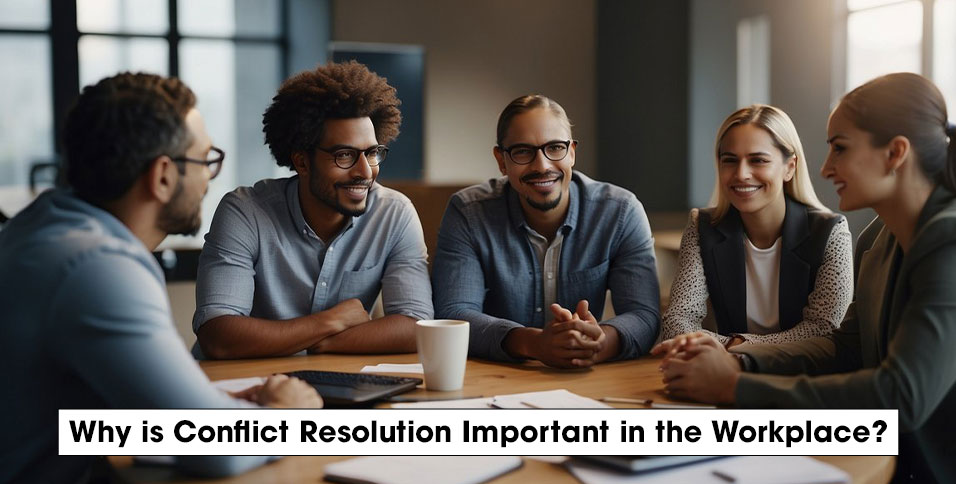Conflict resolution is an essential skill in the workplace due to the diverse range of personalities, backgrounds, and perspectives that employees bring. When conflict is managed effectively, it can lead to improved understanding, increased group cohesion, and enhanced overall productivity. In contrast, unresolved conflicts may result in decreased employee morale, reduced productivity, and can escalate into more serious disputes or legal issues.
Effective conflict resolution contributes to a positive office environment where individuals feel valued and heard. It fosters an atmosphere of cooperation and collaborative problem-solving. When employees are equipped with conflict resolution skills, they are more likely to address disagreements promptly and professionally, preventing the strain of unresolved issues on team dynamics.
Organizations that prioritize conflict resolution also benefit from a stronger corporate culture. This is because successfully navigating through disagreements demonstrates a company’s commitment to maintaining a respectful workplace. Moreover, it encourages open communication and trust among team members, which are vital for achieving organizational objectives and maintaining competitive advantage.
Benefits of Conflict Resolution
Effective human resources conflict resolution is essential for maintaining a productive and harmonious workplace. By addressing disagreements constructively, organizations can tap into a range of benefits that affect team dynamics, personal well-being, and overall company performance.
Improves Team Dynamics
When conflicts are resolved effectively, team cohesion strengthens. Employees learn to communicate better, leading to fewer misunderstandings. This helps in building trust among team members, which is critical for collaboration and collective problem-solving.
Boosts Employee Morale
Employees who feel heard and understood have higher morale. A structured conflict resolution process from human resources ensures that employees have a method to voice and resolve their disputes, which can lead to greater job satisfaction and reduced turnover rates.
Enhances Productivity
Conflicts can be considerable distractions. Resolving conflicts quickly and efficiently minimizes the time spent in disagreements and redirects energy towards productive tasks. Organizations notice an upsurge in output as employees focus more on their work and less on interpersonal issues.
Fosters a Healthy Work Environment
A workplace where conflicts are managed and resolved promotes respect and fairness. This not only encourages a more supportive atmosphere but also makes it a more appealing place for current and potential employees, enhancing the company’s reputation.
Promotes Problem-Solving
A systematic approach to conflict resolution fosters a culture where challenges are addressed directly. Employees are equipped with the skills to identify issues, analyze them, and develop solutions, often leading to innovative ways to overcome workplace obstacles.
Strategies for Effective Conflict Resolution
Effective conflict resolution is crucial for maintaining a functional and productive work environment. Implementing specific strategies can help mitigate issues and promote harmony.
Active Listening Techniques
Active listening is foundational in resolving workplace conflicts. Employees and managers need to focus on understanding the speaker’s message without interrupting or planning a response. Key components include:
- Nonverbal cues: Maintaining eye contact and an open posture to demonstrate attentiveness.
- Reflecting and clarifying: Paraphrasing what was heard to ensure correct understanding and asking questions for clarification.
Negotiation and Compromise
Negotiation involves parties coming together to find a mutually acceptable solution. Compromise is often necessary, with each party making concessions. To effectively negotiate:
- Define the problem: Clearly identify the conflict’s root cause.
- Explore solutions: List potential solutions and evaluate them against each party’s needs and interests.
Mediation and Facilitation
When conflicts become complex, involving a neutral third party can be invaluable. Human resources often provide:
- Mediation services: Where a mediator assists in the discussion without imposing a solution.
- Facilitation: Structuring a dialogue or workshop to foster understanding and collaborative problem-solving.
Training and Development
Proactively equipping staff with conflict resolution skills is vital. Training can cover:
- Conflict resolution frameworks: Teaching structured approaches to addressing disagreements.
- Communication skills: Enhancing assertiveness and empathy in interactions.
Human resources departments can incorporate these strategies into staff development programs to cultivate a culture of effective conflict resolution.
Also Read: Nurturing Diversity, Equity, and Inclusion for a Thriving Workplace Culture















